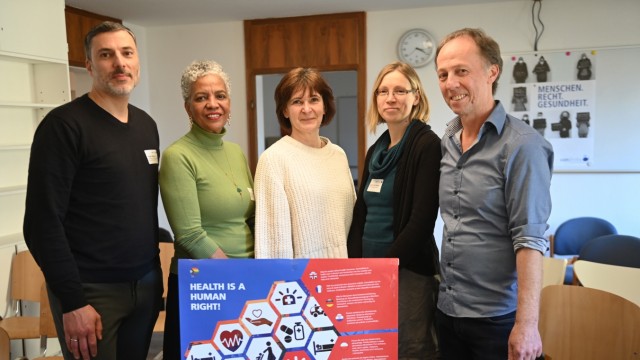Thanks to the clearinghouse, he was able to have an operation: El Rubito de Granada wants to be addressed by his stage name.
(Photo: Stephan Rumpf)
Health insurance is mandatory, that’s what the law says. But anyone who talks to employees of the health clearinghouse of the Condrobs association gets the impression: health insurance is a privilege. Anyone who falls through the cracks has a hard time. And you will feel it at the latest when medical help is needed.
In Rubito’s case it was a heart valve. One day it was broken, says the now 61-year-old in an office at the clearing house. His correct name? “It’s just a registration office name,” he says. He just wants to be called Rubito, that’s what everyone would call him. The thing with the heart valve was in 2022, he could no longer breathe properly, he felt bad, then he passed out, he says.
An emergency doctor took him to a Munich hospital and was told that he still had water in his lungs and needed to be operated on as quickly as possible. When it came out that he didn’t have health insurance, they said: “Oh no, we won’t treat him.” Then he was kicked out, Rubito remembers. A wiry man wearing a man’s hat and a loose-fitting suit vest, his eyes bright blue.
Today he plays the guitar again, as he has done his whole life. Sometimes just on the street. His stage name, El Rubito de Granada, reveals the city in which he was born as Rome. He is so healthy again that he only has to go to regular check-ups. And he has health insurance again.
Like Rubito, many other people in Munich also face the problem of having limited access to the healthcare system because they do not have health insurance. The Condrobs Health Clearinghouse takes care of these people. Exactly how many there are is not recorded centrally. Most of them are not registered anywhere in Germany or do not have German citizenship, but have lived here for years and somehow make ends meet on the black market or on the streets. “They are constantly moving outside the system,” says Dragan Milakovic. He works as a social insurance clerk in the clearinghouse.

In new rooms on Corneliusstrasse: The employees of the Condrobs clearing house and migration advice (from left) Dragan Milakovic, Rita Przygodda, Sybille Lampenscherf, Kathrin Abu-Wishah and Robert Limmer.
(Photo: Stephan Rumpf)
Clearing stands for clarification in English. The goal is to clarify the situation for as many affected people as possible and to reintegrate them into health insurance. There are different ways to do this, depending on how the case is structured, says Milakovic. For some people you realize that there is a claim and that you simply have to apply for the insurance – but then there is also the question of which contributions have to be paid retroactively and how this can be managed. For some it is about checking claims for social benefits. Or to determine whether there is already a right to health insurance in another EU country.
There have been 1,551 advisory contacts since the office was founded in May 2020 to March 2023, says the head of the clearing house Robert Limmer. And the need continues to grow. In total, they have had almost 800 clearing cases so far. It was successful in 52 percent: these people were able to get health insurance again. 388 people received medical treatment thanks to a health fund that the city of Munich had set up specifically for such cases and which the clearinghouse manages. He is happy that the city of Munich has decided to permanently finance the clearing house. This is unique in Germany; other similar positions in the country are merely projects or are organized entirely on a voluntary basis.
The employees recently inaugurated their new rooms at Corneliusstrasse 2 with a reception. Condrobs migration advice is also based there with them. Because very often the clearinghouse’s clients are also migrants. Here they are supported in building a new life. Often it also involves housing issues.
A month in the hospital
Rubito is now also at the migration advice center; he says he does not have German citizenship. “The whole thing about where I live is coming up now,” he says. He lived in a mobile home park for many years, then he was homeless. He is currently renting a room without access to a bathroom or kitchen in a residential building in Schwabing. He reports disputes between him and the landlord, which are very stressful for him.
Rubito was also one of those to whom the city provided medical treatment through the health fund. After his collapse in 2022, he was in the hospital for a month. After his rejection at the first hospital, Rubito came to the clearing house’s consultation and they referred him further.
“How long have you not been to the doctor before?” Limmer now asks him. Oh, laughs Rubito, that would have been 1990. “I’ve never been sick.” That is also a big problem, says Limmer. People who go without health insurance for a long time risk illnesses getting worse. “More things get damaged than people who go to their family doctor regularly.”

